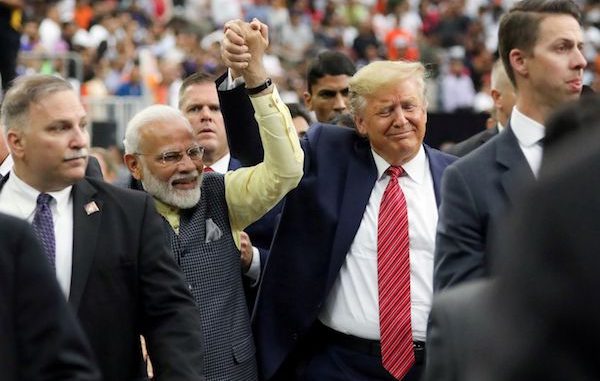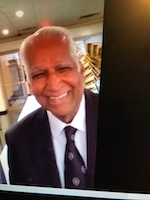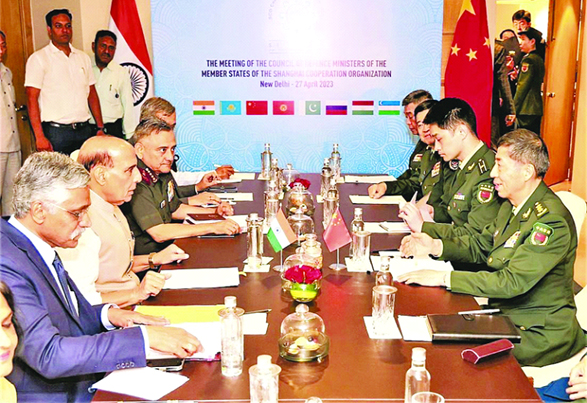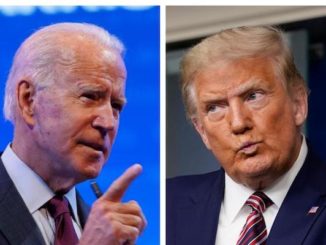

Modi succeeds but Foreign Office and diplomats fail to deliver
In Public Relations, P stands for Performance. R stands for Reporting. Though Prime Minister Modi performs at his highest levels, his diplomats and bureaucrats are failing India. Is there a brief fact sheet on Kashmir? If so, was it handed personally to each and every elected official ? Does the Indian Embassy’s P.R. wing provide the American and Indian American media with material on Indian issues? Is there a White Paper on Kashmir?
While Modi succeeds in his personal diplomacy, his diplomats fail in their duties, disappointing Modi, the Indian Diaspora and India. And Pakistan has capitalized on the failure of Indian foreign office and its diplomats.
Prime Minister Modi provides a refreshing contrast to International Relations during the Nehru dynasty era. Modi has mastered the art of high-level diplomacy. His diplomatic skills and personality have transformed India’s foreign policy fulfilling the self-interest of India. In building close relations with the heads of states , he has formulated his personal strategy to work with the leaders of the Indian diaspora in the USA, Canada, U.K., Japan, Singapore, Australia, South Africa and the Middle Eastern countries. Though the Indian diaspora are loyal to the countries they are settled in they have time and again displayed their love of India and its Prime Minister. The “Howdy Modi” spectacular event drawing 50,000 Indian Americans in Houston became an epoch-making event because Modi invited President Trump as his guest. The Indian diaspora organized rallies for Modi in various locations of the world and through their loyalty and political strength, Modi was able to create his own style of diplomacy. As a result, the diplomats in foreign embassies were just onlookers or honored guests at these Indian diaspora sponsored events.
We have seen how Prime Minister Modi has been highly successful in initiating, developing and nurturing personal relationships with the heads of states. The photographs showing the body language are a testament to his personality and likeability. Thus, he is creating not only his personal image but also reinforcing the image of India and the Indians through the Indian diaspora. What Modi has achieved is quite novel because this was never done before.
While Modi succeeds in his personal diplomacy, his diplomats fail in their duties, disappointing Modi, the Indian Diaspora and India. And Pakistan has capitalized on the failure of Indian foreign office and its diplomats. One may like to know how. Pakistan succeeded in planting an op ed column by Prime Minister Imran Khan of Pakistan in the New York Times, just a week before the U.N. General Assembly session in New York and the “Howdy Modi” event in Houston on September 22, 2019. This article was a propaganda piece condemning India based on misstatement of facts on Kashmir. When such a column appears, it is customary for the NYT to publish a counter column by India. Unfortunately no column was written and published by Prime Minister Modi or Foreign Minister Jayashankar or Indian Ambassador to the USA Shringla. I am sure if a counter column had been written and sent to the NYT, it would have published it.
It must be pointed out that Pakistan’s diplomacy and public relations are more efficient than India’s. Failure of Indian Foreign Office to follow up on the goodwill and friendship created by Prime Minister Modi has created opportunity for Pakistan to make propaganda against India. The Washington Post and the New York Times have been writing editorials and columns against India’s policies in Kashmir. These two important media keep on publishing dispatches from India against India’s policies in Kashmir. India has adequate resources to employ a topnotch Communications and Public Relations firm to handle its publicity. It is important they engage one immediately because the NYT and the Washington Post continue to publish anti-India articles on Kashmir. I recall Indian Ambassador Naresh Chandra was on all TV channels for several days consecutively to educate Americans on India’s testing of nuclear bomb in 1998.
Failure of Indian diplomacy and lobbying have resulted in anti-India resolution by the U.S. House of Representatives . It was reported that Foreign Minister Jayashankar stayed in Washington D.C. after the “Howdy Modi” event to attend India-US Strategic Partners meeting. Failure of Indian diplomats to convince Indian American Congressman Khanna of California made him join the Pakistan caucus in the Congress. Indian Americans are protesting. This is disgrace for India and very disappointing. Khanna along with Congresswoman Jayapal of Washington State ganged up and convinced the Congress to sponsor and adopt resolution against India on Kashmir. There are approximately 100 Indian diplomats in the USA working in Washington D.C and elsewhere in San Francisco, New York, Chicago, Houston, Atlanta and the Indian Mission to the U.N. These diplomats should be cultivating every elected official to the U.S. House of Representatives and the U.S. Senate. Dinners and cocktail parties are no substitutes to educating and tutoring India’s policies to the elected officials.
In Public Relations, P stands for Performance. R stands for Reporting. Though Prime Minister Modi performs at his highest levels, his diplomats and bureaucrats are failing India. Is there a brief fact sheet on Kashmir? If so, was it handed personally to each and every elected official ? Does the Indian Embassy’s P.R. wing provide the American and Indian American media with material on Indian issues? Is there a White Paper on Kashmir?
If the Indian Embassy headed by its Ambassador had provided better leadership in educating each and every elected official, I am sure the Congress would not have ventured into sponsoring an anti-India resolution. This is the first of its kind since I arrived here in 1954.
Modi is the conductor for his diplomatic orchestra and India can succeed only if all his foreign office officials and the diplomats play their instruments in unison. Modi’s personal diplomacy and foreign policy should be played like an orchestra. Now, of course, Prime Minister Modi has brought in the Indian diaspora. President Bush, Obama and Trump have credited the Indian Americans as an important factor in U.S.—India relations. The Indian American leadership has been making its contributions to foster Indo US relations to oppose military aid to Pakistan; to take action against Pakistani terrorists who attacked Mumbai and the Indian Parliament, and in support Civil Nuclear Deal, etc.
I was with the Permanent Mission of India to the U.N. from 1954 to 1964, first as Private Secretary to V. K. Krishna Menon, Defence Minister and Chairman of Indian Delegation to the U.N. and later as Adviser, Security Council, Economic and Social Council, and the General Assembly. I recall, Krishna Menon put the Indian Mission on a war footing for three days and all officials and the staff worked 24/7 to produce a 300-page document as annexure to his 7-hour speech on Kashmir in 1957. Pakistan had the political support and wanted a plebiscite in Kashmir in accordance with the U.N. resolution. Krishna Menon argued and reiterated that Kashmir’s accession to India is full, final and complete. He pointed out that the resolution on Kashmir had three operative paragraphs. Therefore, the first step in the process is for Pakistan to vacate its aggression in Kashmir. Unless and until Pakistan vacates its aggression and normal conditions of peace exist, no steps can be taken towards processing plebiscite. The Mission was lean and mean with three First Secretaries and an Ambassador, but everyone worked creatively and hard. The Indian Delegation was the most active delegation amongst 60 members at that time. India made huge contributions in solving major political issues – Korean War; Suez War; Decolonization of the world; creation of International Atomic Agency, etc.
India has highly qualified and experienced diplomats and I respect them. The purpose of this article is to serve as a reminder to Indian Foreign Minister Jayashankar and Indian Ambassador to the USA, Shringla that they have to make sure they educate all elected officials on major Indian issues, be it Kashmir or Investment or others. Failure of Indian diplomats to compete with Pakistan’s diplomats has resulted in an anti-India resolution in the Congress. All planning and steps should be taken to make sure such major mistakes are not repeated. I do not think there is any excuse for not planting an OPED column by Prime Minister Modi in the NYTimes immediately after Prime Minister Imran Khan published his.
(The author came to the USA in 1954 on Mrs.Vijayalakshmi Pandit Scholarship. He is a Senior Adviser to the Imagindia Institute, a think tank in New Delhi; Chairman, Asian American Republican Committee (founded in 1988); former President & CEO, First Asian Securities Corporation, NY. Lives in Scarsdale, NY. He can be reached at vpwaren@gmail.com)





Be the first to comment